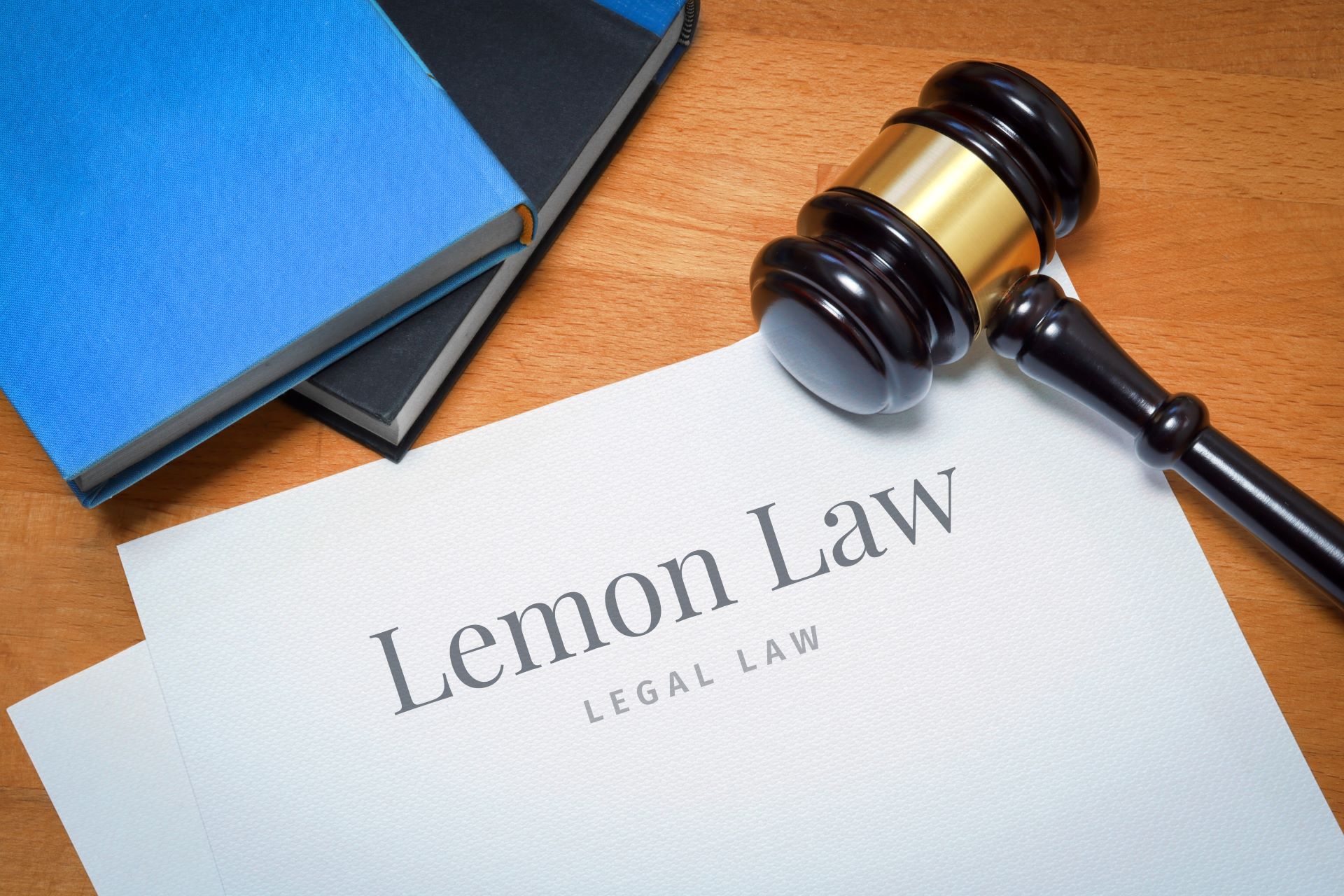Now Reading: Understanding Lemon Car Laws: A Guide To Protection And Compensation
-
01
Understanding Lemon Car Laws: A Guide To Protection And Compensation

Understanding Lemon Car Laws: A Guide To Protection And Compensation
To protect consumers, and the large investments they made, all states have lemon laws that require a manufacturer or dealer to either repurchase or replace vehicles with substantial defects.
Below, we will discuss the nuances that make up lemon law and how to best protect yourself should you think you have a claim. It is important to know details such as the number of visits or time out of service required, along with the mileage constraints, to best insulate your claim and understand your rights.
What is Lemon Law?
Lemon Law protects consumers who purchase or lease a vehicle that has a substantial defect that cannot be repaired in a reasonable amount of time or number of attempts. A reasonable amount of time or number of attempts is generally defined as three or more visits to the dealership or more than twenty days out of service.
If a manufacturer is unable to fix a defect in your car within this time frame, and the defect is one that substantially impairs the use, value or safety of the vehicle then you have a lemon.
Lemon Law Criteria: What Makes a Car a Lemon?
What’s important to remember is that the new and used car lemon laws vary by state. Though you’ll find some consistencies between state laws in New Jersey, New York, Pennsylvania and Maryland, they differ in small details.
For example, the time period in which a defect must arise, along with the number of visits required is not consistent in every state. These subtle differences are why it is important to have an experienced attorney by your side, early in the process, to ensure your rights are protected.
You can read about state lemon laws in more depth here: PA Lemon Law, NY Lemon Law, NJ Lemon Law, MD Lemon Law.
When it comes to defective motor vehicles, your consumer protection is our top priority. All cases are reviewed by an experienced lemon law attorney.
New Car vs. Used Car Lemon Law
Due to the similarities between the new and used car lemon laws, it can be difficult to know which one applies to you and your situation. Use our table below to understand which law can help you get out of your defective vehicle.
New Car Lemon Law
The car must be purchased or leased new or very early on in the vehicle’s life, and the defect must arise during a certain time period.
- NJ defect must arise within the first 2 years or 24,000 miles
- PA defect must arise within the first year or 12,000 miles
- NY defect must arise within the first 2 years or 18,000 miles
- MD defect must arise within the first 2 years or 18,000 miles
The vehicle must also be returned to the dealership a certain number of times to qualify.
- In NJ, you must return the vehicle no less than 3 times or have it out of service greater than 20 days.
- If there is a defect that may cause serious bodily injury or harm, only 1 visit and problem continuing is needed.
- In PA, you must return 3 times and the defect must continue to exist or have 30 days out of service.
- In NY, you must return no less than 4 times or have the vehicle out of service greater than 30 days.
- In MD, you must return no less than 4 times or have the vehicle out of service greater than 30 days.
The defect must substantially impair the vehicle’s use, value or safety.
Used Car Lemon Law
Of the four states, only New York and New Jersey have a used car lemon law. Pennsylvania and Maryland do not.
In both NY and NJ a car must be purchased with less than 100,000 miles on the odometer. NJ has an additional requirement that the vehicle must be less than 7 years old at the time of purchase, but the manufacturer’s warranty must be expired and the car must be returned for a covered defect within the lemon law warranty period.
Lemon Law Warranty Period
| NJ Used Car Lemon Law | NY Used Car Lemon Law |
| Less than 24,000 miles, the warranty period is for 90 days of 3,000 miles | 18,001-36,000 miles the warranty period is 90 days or 4,000 miles |
| 24,000-60,000 miles, the warranty period is 60 days or 2,000 miles | 36,001-79,999 the warranty period is 60 days or 3,000 miles |
| 60,000-100,000 miles, the warranty period is 30 days or 1,000 miles | 80,000-100,000 miles, the warranty period is 30 days or 1,000 miles. |
In NJ the car must be returned no less than 3 times within the warranty period or out of service for greater than twenty days. NY requires that the car be returned no less than 3 times within the warranty period or out of service for greater than 15 days.
The used car lemon laws delineate the items that must be covered by the warranty, and the defect must substantially impair the vehicle’s use, value or safety.
Commercial Vehicle Lemon Law
Unfortunately, most states exclude commercial vehicles from lemon law due to the tax benefits consumer vehicles are allotted. However, if you have a commercial vehicle that is experiencing defects, you may qualify for either the Magnuson-Moss Warranty Act or breach of warranty under the Uniform Commercial Code.
The basic requirements are that a vehicle has been delivered to an authorized dealership three or more times for the same defect or the vehicle is out of service greater than thirty days for an issue. Again, the requirements vary depending on the type of vehicle, so it is important to speak with an experienced attorney to understand your rights.
When the defective motor vehicle was purchased
It is important to start your lemon law action as early as possible to increase your chances of recovery. Every state has a time limit in which you are permitted to bring a lemon law claim and it is usually three to four years after the purchase or lease of your vehicle. However, you do not want to wait until just before the time limit expires to get a claim started. The earlier the process starts, the sooner you can be free of your defective vehicle.
Miles on the vehicle at the time the defect arises
Each state’s lemon law requires that the defects arise within a certain amount of time or miles on the vehicle in order to qualify:
- Pennsylvania is 12 months or 12,000 miles.
- New Jersey is 24 months or 24,000 miles.
- New York and Maryland are 24 months or 18,000 miles.
To qualify under lemon law, the issue must be one that substantially impairs the vehicle’s use, value or safety. Generally, this means that the defect must be one that impairs the drivability of the vehicle.
Each state evaluates this threshold differently, so it is important to have an experienced attorney who understands what each state finds important in evaluating lemon law cases to best advocate your position.
How to determine a reasonable amount of time to repair
Each state requires that a vehicle manufacturer be given a reasonable amount of time or number of attempts to fix a defective vehicle. Across the board, thirty days is the magic number for a reasonable amount of time to repair; should a manufacturer surpass this amount of time, you may have a lemon.
However, this is not the only determining factor. The number of visits a consumer makes to a dealership for repair is also important. Generally, if a car is returned to a dealership three or more times for the same defect, you may have a lemon law claim.
For example, Pennsylvania requires three visits to the dealership and the problem continues to exist in order to qualify. In New Jersey, three is also the threshold unless a defect may cause serious bodily harm or death, then only one attempt at repair is permitted before lemon law comes into play.
COMMON LEMON LAW MANUFACTURERS
There is no sure-fire way to avoid a lemon as all vehicle makes and models are susceptible. The best thing you can do before purchasing or leasing a car is to be well-informed and research any complaints or recalls on the vehicles you are considering.
Some examples of vehicles with common complaints include the following:
- 2015-2017 Dodge Ram 1500 – Harsh shifting and clunking.
- 2015 Dodge Dart – Engine may stall and/or die while driving.
- 2015-2016 Chrysler 200 – Rough shift, jerking or stuttering when accelerating.
- 2015 Chevrolet Colorado – Shaking/vibration or clunking noise while driving.
- 2017 Chevrolet Colorado – A surging or jerking from the transmission.
- 2015 Ford F150 – Harsh downshift, excessive vibration or a feeling that the gears are slipping.
- 2016 Ford F-150 – Engine may stall causing the vehicle to go into limp mode or shut off while driving.
- 2016 Honda CRV – Vehicle may vibrate or shake at low speeds.
- 2015-2017 Hyundai Sonata – The engine may stall or shut off while driving and this may cause the check engine light to illuminate.
- 2015-2017 Jeep Cherokee/Grand Cherokee – Transmission may have a delayed shift, rough shifting or spike in RPM’s while downshifting.
- 2015-2017 Nissan Altima – Transmission defects in the form of hesitation, vibration or failure to shift properly.
*all information included above is based on complaints reported by carcomplaints.com*
ABOUT THE MAGNUSON-MOSS WARRANTY ACT
This Act is a coverall that assists consumers who have defects in their vehicle that would not be considered substantial or that arose after the designated lemon law period. The Magnuson-Moss Warranty Act is a federal act that is meant to ensure that the warranties issued by car manufacturers are upheld.
If any warrantable defect is not repaired within three repair attempts or thirty days out of service, then the warranty is breached, and the consumer may be entitled to damages. These damages are generally assessed as a percentage of the vehicle’s purchase or lease price back to compensate the consumer for any loss in value in the vehicle due to the defect.
FILE A LEMON LAW CASE IN NJ, NY, PA OR MD
The Robison Lemon Law Group, LLC provides free consultations to all consumers who believe their lemon law rights may be violated. We are here to help you navigate the lemon laws in your state and provide a step by step guide to the process. If we accept your case, you are not charged for our services as compensation comes directly from the manufacturers.
In addition, we put our years of experience to work by communicating with dealers and manufacturers on your behalf, and we keep you updated every step of the way, so you always know the current status of your case.
WHAT TO DO IF I’M DRIVING A LEMON?
The best thing to do is to collect all the repair orders documenting your visits to the dealership. These repair orders are crucial to proving your lemon law claim.
You should also be keeping your own log that details visits to the dealerships and calls to the manufacturer or dealership about the defect.
It can also be very important to provide evidence of the actual defect occurring in your vehicle. Any videos or photos that can be safely taken of the defect happening can be very important, especially in cases where the dealership claims the defect cannot be duplicated.
Don’t put off your case any longer. At Robison Lemon Law Group, LLC we’re passionate about making sure consumers receive the justice they deserve. Contact us today for your free, no-obligation evaluation.










